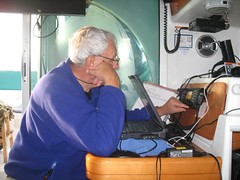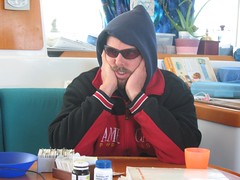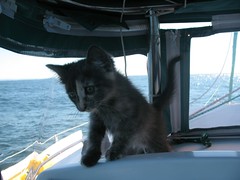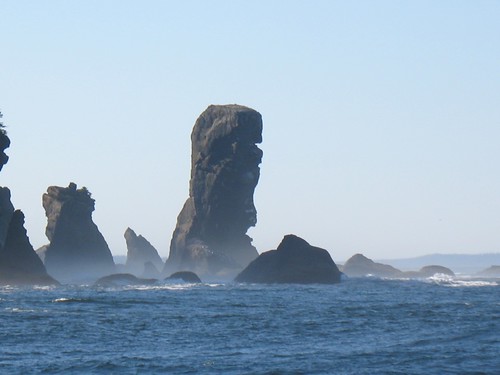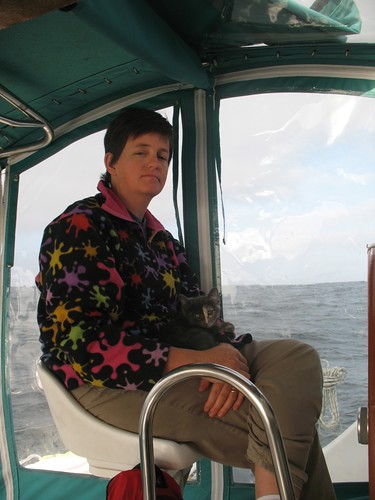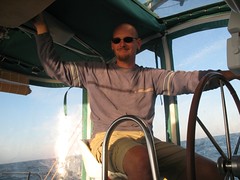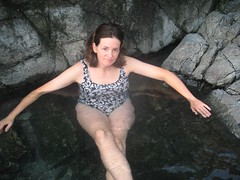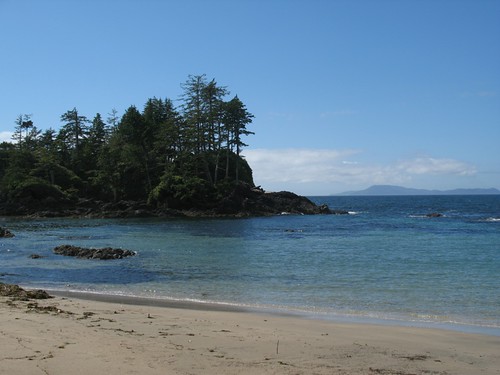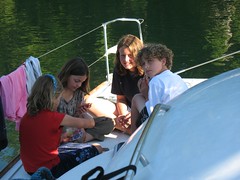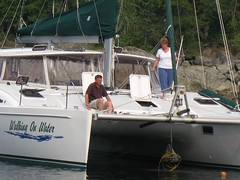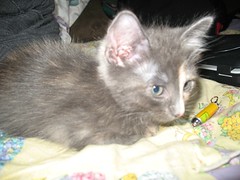One of the most draining aspects of passage making is the volume. I had not anticipated how loud it is when you go to sea. There are many sources of noise when you are in large wind and wave -- most irregular and several highly disturbing. The din takes time to adjust to as your hind brain sorts through the cacophony and starts to selectively ignore the bangs and beeps it can do nothing about. Until this process is complete, you will find it nearly impossible to concentrate or to sleep. I encourage you to feed your hind brain in advance with multivits and a couple of hours of Discovery Channel shows about our Neanderthal ancestors to remind it of its incredible adaptive abilities. Confidence in passage making is key.
Consistently, the loudest noise is the slapping of water against the hull. Even time spent cruising bays, sounds and inner passages and nights on a rocky anchor does not prepare you for the volume of wave slap in ocean swell. There are swooshy gliding sounds as the boat surfs over and through waves. There are splashy splochy sounds as waves crest nearby and drench the deck. Then there are the wappy, smacky sounds as wavelets beat themselves to death on the obdurate fiberglass of the hull.
The ones that really get you going, though, are the really loud bangs which sound exactly like a 2 x 4 wielding sea monster has reached up from the depths and rapped your boat sharply on her nose. These whacks do not in any way sound like water. You will be convinced the first two to three hundred times this happens that the boat has just run into a large tree. It is, even after the thousandth time, nearly impossible to comprehend that the sound is generated by a wave bashing its head against the beam. I challenge you to sleep through these even with the most highly evolved hind brain.
Catamarans in particular are also plagued by something known as "bridge deck boom." This is the sound generated by waves slapping against the bottom of the bridge deck between the two hulls. All catamarans boom. Or more precisely, for every catamaran there is a set of wind and wave conditions which make the boat boom. Designers around the world work to reduce the boom through baffles, angles and nacelles, height above water, and other factors. This results in models which are more "boomy" than others. However, no design escapes booming entirely.
When you get a boom condition, a large volume of water hits the underside of the salon like a toddler with a drum strick on mommy's favorite antique dresser. The shape of the boat, the air space within, create a perfect resonating chamber. The boom radiates out of the salon and down into the cabins where it works its way from your feet up to your eyebrows and fades out the top of your head.
In addition to wave noise, sound emits from your source of fuel. If you are motoring, there is the constant drone of a large diesel engine. If the wind is strong enough to enable you to sail, it is strong enough to vibrate the mast and tensioned running rigging. If the wind is really strong, the combined wind and wave outside sound like a freight train rolling over the boat.
Underlying all the big sounds are the endless number of tiny sounds which roll together into a white noise of clacks, creaks, squeaks, pops, and bangs. Plates, cups, utensils in lockers. The flashlight rolling on a counter. A soft flap of paperbacks rocking back and forth on the shelf. A strange buzz from the stove vibrating in resonance with the engines. The Coast Guard on VFH channel 16 droning on about bar reports, the sound of air flowing through the empty galley sink drain, a spare halyard knocking against the mast, your stomach growling, the kitten purring cat food breath into your ear. I can't catalog all the sources, and there is simply no way you could control them all through padding, oiling, and diligent desqueakifying.
At 0400 having been on watch for three hours, with the red lights dimly illuminating the salon, a new sound emerges. The sound is deep, low, liquid, and buzzes along the nerves with the after effects of sleep deprivation, over caffeination, and exhaustion. This is the sound of my brain melting.
Monday, September 29, 2008
Thursday, September 25, 2008
TechTip - Mal de Mer
 Readers asked me to provide more detail about our Counter Sea Sickness Offensive, also known as Operation Ocean Ack. First off... I am not a doctor. I do not play a doctor on T.V. I do not even own a T.V. Do not take anything I say as medical advice. More importantly, do not even think about suing me if you decide to try any of these medications. This is just what is working on s/v Don Quixote.
Readers asked me to provide more detail about our Counter Sea Sickness Offensive, also known as Operation Ocean Ack. First off... I am not a doctor. I do not play a doctor on T.V. I do not even own a T.V. Do not take anything I say as medical advice. More importantly, do not even think about suing me if you decide to try any of these medications. This is just what is working on s/v Don Quixote.Short Answer - We use a combination of first level homeopathic remedies and pretty powerful anti-nausea drugs to beat back mal de mer.
Long Story - Sea sickness hits everyone eventually. As with so many salty issues of nautical accomplishment, there are those who have done it, those to whom it will happen soon, and those who lie. This truism holds for everything from running aground to spending 24 hours vomiting in the head. Some day, you will meet a sea condition that will take you down. It doesn’t have to be big sea, choppy sea, or windy sea. It just has to be the sea with your name on it.
Let's start with the most important bit about sea sickness. Once you get sick, it is damn near impossible to stop throwing up. So with every fiber of your being, you need to prevent yourself from getting sick in the first place. And of course, it really appears that all the best 'remedies' for sea sickness start with the recommendation, "Take the day before you go to sea." Gee thanks. So in addition to everything else you must contend with prior to departure, you need to make sure you drug the entire crew.
Because there is an escalating scale to how much you need to intervene to address sea sickness, it is challenging to figure out where you should start your intervention. We like to begin with a highly advanced, pharmaceutical approach and then gently taper back until the boat is running on ginger snaps and Top Ramen. With experience, you’ll know at what point on the escalation path you need select with each crew member.
Open Air Cures - The simplest cure for queasiness is visibility and fresh air. Stop what you’re doing, look up, look around, go out into the cockpit. Take the helm. Put on some really bouncy music that makes you want to dance. Dance on the deck while you stare around. Alternatively, just go to sleep.
Food - Some foods that settled the tummy are ginger snaps, ginger ale, saltines, and graham crackers. My girls also do well pretzels. Think bland, dry, and gentle. Top Ramen and macaroni and cheese are good for hot foods. Stick to non-caffeinated, low sugar, and low acid beverages.
Berkeley Ideas - There are many, many natural and homeopathic methods to stave off sea sickness. I have had a great deal of success with acupressure bands. There are those that swear by the press-on acupressure dots. Papaya enzyme is good as an antacid. You might also try other homeopathic or natureopathic supplements. I haven’t tried any other than papaya so I can’t speak to their efficacy.
Meclizine HCl - DrGeorge recommends an over the counter anti-emetic called meclizine. Look it up. It's good stuff. It doesn't make you drowsy, which is key. You can take 25 mg twice a day starting the day before, and it does a really good job of keeping the beast at bay. DrC and I took it throughout our passage, and neither of us experienced a moment of sea induced queasiness. I did have that one hour of wanting to toss my cookies in sheer unadulterated terror, but I don't think that counts.
More Meds - Crew that have never been sick are recalcitrant and will not take their meclizine in advance. You'd think the stuff was nasty like that grape antibiotic we feed our kids. It's just a small blue pill, for gods sake. But crew will balk and then proceed to get violently ill. At which point you have to go all macho captain on them and law down the medical law. People who do not get better within about 24 hours can actually start doing themselves some pretty serious harm.
Even at this juncture, you have several options. You can try dramamine crushed under the tongue, the meclizine they should have been taking all along, or a club to the head. But if the boat is really rocking and you've got a true sicky aboard, these measures might be too little too late. The problem is that nothing is staying down your boat's victim. Now you need to start getting really personal.
Suppositories - When there is no other way to get meds into a crew member, we intervene with a suppository dose of prochlorperazine 25 mg. It's available by prescription only so you'd need to get this from a doctor in advance. You can probably get some by taking an emergency medicine course and getting the prescription from the instructor. It's very good to have aboard and should only be taken when you simply can't get the crew member to stop vomiting and start sucking down fluids.
Points Beyond - After that, the problem goes beyond my ability to even speculate what you should do. Dehydration can kill so this isn't just an unpleasant problem. Land is your best bet, but if not land you can look at evacuation off the boat, enemas, and other more serious interventions. Fortunately, we have not as yet made it to this step and are unlikely to do so in the near future. Coastal cruising at least ensures that you can generally drop a really sick crew member on to a rock within 48 hours of any location.
Now someone please give me a cure for land sickness.
Sunday, September 21, 2008
Passage Notes - Part 1
Of course, now that I've actually completed one (1) passage, I am officially an expert on the subject. This is the Toast Way. With all the confidence of a thirty year veteran, I feel qualified now to tell all you dreamers precisely what to do. I restrain myself not out of a sense of experiential deficiency but merely because the subject is so thoroughly covered in the cruising literature by such luminaries as the Pardeys and -- my personal favorite -- Bob Bitchin'.
Instead, I would like to offer some suggestions for the complete passage n00b. This would be the bedazzled sucker who believes her father in law and husband that Neah Bay to San Francisco is not particularly long or challenging during the pleasant months of August and September and who is deluded into believing that both her body and her boat are ready for "big water." I will try to limit myself to only those suggestions that I completely failed to see in my extensive review of the cruising books. If these notes were in there, I must have slept through that day of class.
Contents May Shift During Flight - No matter how tightly packed, no matter how well prepared, everything in your lockers will be both shaken and stirred. Inevitably, something will maneuver itself to the front of the locker only to emerge with a shout of glee and a shatter of glass on opening. Sometimes it is the kitten. More frequently it is something that either (1) can not be easily replaced, (2) requires a vacuum to clean up, or (3) exudes a rank smell that makes everyone want to vomit. Bring lots of rags and the patience of Job, and be careful opening doors.
Everything that Worked, Breaks - We left with a short list of Things Not Yet Fixed (patent pending). We arrived with an extraordinarily long list of stuff that didn't survive the beating. Apparently all the southeasterlies off Vancouver were insufficiently destructive to break our gear conveniently before we left Seattle. So now we have about two hundred things to do in San Francisco. A full passage plan includes weeks at your destination to put the boat back together.
Better Living Through Chemistry - One of our crew arrived with acupuncture dots to help with nausea. The sea jeered him and roundly smacked him upside the head with a 24 hour bout of the nastiest sea sickness I've seen in a long time. Dry heaves are horrid. Don't go there. There are nasty drugs now that you can take to poison your system utterly in a valiant effort to battle off the queasies on the theory if you are sufficiently dead, you can't vomit. Just take them. Trust me. Ultimately, we had to put him on prochlorperazine. The rest of us -- and Jason after we got him back on his feet -- took meclizine 25 mg twice a day. The later is an anti-emetic that does not cause drowsiness. After a few days at sea, we all were able to taper off and by the fourth day we were even reading books.
More Pills Are Better - In addition to the anti-nausea drugs, there are some things you can do to make your body limp along in the very draining conditions of a passage. We made liberal use of the following:
* Papaya enzyme - A really effective and tasty antacid
* Metamucil - Makes you regular which is a complete boon at sea, let me tell you
* Arnica - A homeopathic which works well to speed healing of bruises and can be taken orally or topically
* Ibuprofin - Buy in the huge Costco generic size since you'll have a headache big time
* Vitamins - eating is more sporadic and a multi-vit per day is a good idea
General Foods International Coffees - I hate these usually. They are too sweet and a poor excuse for coffee. However, on watch it is a blessing to just heat a pot of water and let your crew help themselves. Lay out a tray with instant coffee, teas (mint, green and black), and instant soup. The biggest problem in feeding my crew was keeping them hydrated as they tended to drink too little. I did everything I could to tempt them to drink more.
Do Not Bring the Cat - Dulcinea had the time of her life. She loves boat life. The problem is that she LOVES boat life. She is all over this damn boat all the time. Being a cat, she is always in precisely where you want to step. She wants to go on deck in 40 knots winds to play with the whipping straps on the bimini covers. She wants to play on your face in the middle of your off watch. It's like going through finals week in college with an asshat 14 year old child prodigy armed with a brand new Wii and a crush on you. I should have made the grandparents deal with the kitten.
Even Catamarans Rock and Roll - Catamaran motion is called -- sometimes pejoratively, sometimes fondly -- a rocking horse motion. This description is particularly apt during the long haul. While there is no leaning, there is still considerable motion as you sit, drive, contemplate your navel, or attempt to sleep. While catamaran owners do not need to invest in lee clothes, I do recommend a bunch of extra blankets, pillows or bolsters. Place these around your body as you sleep, and your fat will jiggle considerably less. This assumes you are not using the passage to jiggle your fat off, though, a widely proven weight loss technique.
iPod, Accept No Substitute - Seriously. Stop screwing around with competitor products or your radio or, god forbid, CDs. Just invest in an iPod for each crew member. Fill it with music, audio books, and podcasts. Make sure your stereo system has an iPod-in capacity. Make it a Writ From Captain that crew on helm make ALL decisions about what to play, method of delivery (personal ear buds or system stereo), and how loud to play it (within reason).
Let me close these notes with a short list of things you do not need to bring for your passage: books, video games, spicy foods, alcoholic beverages, board games, needlework, carpentry projects, movies, makeup, condoms, or hiking shoes.
Instead, I would like to offer some suggestions for the complete passage n00b. This would be the bedazzled sucker who believes her father in law and husband that Neah Bay to San Francisco is not particularly long or challenging during the pleasant months of August and September and who is deluded into believing that both her body and her boat are ready for "big water." I will try to limit myself to only those suggestions that I completely failed to see in my extensive review of the cruising books. If these notes were in there, I must have slept through that day of class.
Contents May Shift During Flight - No matter how tightly packed, no matter how well prepared, everything in your lockers will be both shaken and stirred. Inevitably, something will maneuver itself to the front of the locker only to emerge with a shout of glee and a shatter of glass on opening. Sometimes it is the kitten. More frequently it is something that either (1) can not be easily replaced, (2) requires a vacuum to clean up, or (3) exudes a rank smell that makes everyone want to vomit. Bring lots of rags and the patience of Job, and be careful opening doors.
Everything that Worked, Breaks - We left with a short list of Things Not Yet Fixed (patent pending). We arrived with an extraordinarily long list of stuff that didn't survive the beating. Apparently all the southeasterlies off Vancouver were insufficiently destructive to break our gear conveniently before we left Seattle. So now we have about two hundred things to do in San Francisco. A full passage plan includes weeks at your destination to put the boat back together.
Better Living Through Chemistry - One of our crew arrived with acupuncture dots to help with nausea. The sea jeered him and roundly smacked him upside the head with a 24 hour bout of the nastiest sea sickness I've seen in a long time. Dry heaves are horrid. Don't go there. There are nasty drugs now that you can take to poison your system utterly in a valiant effort to battle off the queasies on the theory if you are sufficiently dead, you can't vomit. Just take them. Trust me. Ultimately, we had to put him on prochlorperazine. The rest of us -- and Jason after we got him back on his feet -- took meclizine 25 mg twice a day. The later is an anti-emetic that does not cause drowsiness. After a few days at sea, we all were able to taper off and by the fourth day we were even reading books.
More Pills Are Better - In addition to the anti-nausea drugs, there are some things you can do to make your body limp along in the very draining conditions of a passage. We made liberal use of the following:
* Papaya enzyme - A really effective and tasty antacid
* Metamucil - Makes you regular which is a complete boon at sea, let me tell you
* Arnica - A homeopathic which works well to speed healing of bruises and can be taken orally or topically
* Ibuprofin - Buy in the huge Costco generic size since you'll have a headache big time
* Vitamins - eating is more sporadic and a multi-vit per day is a good idea
General Foods International Coffees - I hate these usually. They are too sweet and a poor excuse for coffee. However, on watch it is a blessing to just heat a pot of water and let your crew help themselves. Lay out a tray with instant coffee, teas (mint, green and black), and instant soup. The biggest problem in feeding my crew was keeping them hydrated as they tended to drink too little. I did everything I could to tempt them to drink more.
Do Not Bring the Cat - Dulcinea had the time of her life. She loves boat life. The problem is that she LOVES boat life. She is all over this damn boat all the time. Being a cat, she is always in precisely where you want to step. She wants to go on deck in 40 knots winds to play with the whipping straps on the bimini covers. She wants to play on your face in the middle of your off watch. It's like going through finals week in college with an asshat 14 year old child prodigy armed with a brand new Wii and a crush on you. I should have made the grandparents deal with the kitten.
Even Catamarans Rock and Roll - Catamaran motion is called -- sometimes pejoratively, sometimes fondly -- a rocking horse motion. This description is particularly apt during the long haul. While there is no leaning, there is still considerable motion as you sit, drive, contemplate your navel, or attempt to sleep. While catamaran owners do not need to invest in lee clothes, I do recommend a bunch of extra blankets, pillows or bolsters. Place these around your body as you sleep, and your fat will jiggle considerably less. This assumes you are not using the passage to jiggle your fat off, though, a widely proven weight loss technique.
iPod, Accept No Substitute - Seriously. Stop screwing around with competitor products or your radio or, god forbid, CDs. Just invest in an iPod for each crew member. Fill it with music, audio books, and podcasts. Make sure your stereo system has an iPod-in capacity. Make it a Writ From Captain that crew on helm make ALL decisions about what to play, method of delivery (personal ear buds or system stereo), and how loud to play it (within reason).
Let me close these notes with a short list of things you do not need to bring for your passage: books, video games, spicy foods, alcoholic beverages, board games, needlework, carpentry projects, movies, makeup, condoms, or hiking shoes.
Wednesday, September 17, 2008
I'm Sleepy
Author Note: Written towards the end of our recent passage from Seattle to San Francisco.
Doing the Neah Bay to San Francisco run feels like a cross between a major product release, finals week, and running a marathon. There is a slow drain of energy leaching out of the back of my head and through my toes which renders me progressively punchier, crankier, and smellier.
I have no idea how people do this for months on end. We must be doing something wrong.
We’re such beginners at everything big water that I would not be surprised to learn that we had essentially just conducted the most poorly mismanaged passage in the history of the fall migration of small craft from the Pacific Northwest to Mexico. I don’t actually know it is, but I bet there was something big we left out. For example, maybe we forgot to bring a Magic Energy Pill. Or perhaps we were supposed to simply shut everything down at night and stop moving. Maybe it is brain numbingly stupid to try to do this using a blue water route, straight-through with no stops. The idea that most tickles me at the moment is that I simply forgot the live, virginal sacrifice prior to embarkation.
Alternatively, there is nothing wrong at all, our exhaustion is normal, sailors adjust to long stretches at sea over time. There is evidence to support this theory. The first few days I did nothing but watch the helm, cook for crew, and sleep. Gradually, I added conversation and basic maintenance housekeeping. By the third day, I could play with the cat, do a credible imitation of David Sedaris, and bake muffins from scratch. The fourth day was absolutely breakthrough; I started typing and reading.
Yet here we are at day eight, and I feel like I’ve been run over by a tractor trailer. Exhaustion is naturally a byproduct of our watch schedule which has Jason and I tackling the entire graveyard shift. The schedule came about as a combination of design, desire, and natural inclination so I’m not complaining. Jason is a night owl, I’m an early bird, DrC can’t function between the hours of 11pm and 7am if his life depended on it. George appears to work reasonably well at any hour, lucky him. While I’ve largely adjusted to the shifted work-sleep schedule, some of my lethargy must surely be induced by whacked biorhythms.
Let’s also remember one very salient fact about screwing with my work - sleep schedule. I do not work. I’m an unemployed, itinerant freelance humorist with no income, no prospects, and a completely dismal professional future. All this passage making, helm watching, crew cooking, and boat straightening feels way too much like work. Hard work.
Tomorrow we arrive in Emeryville where we are forced to dock for two weeks while we fix key pieces of the boat that chose to fall off during the passage. We can't move, anchor, or visit fun boating highlights of the Bay Area. Let me tell you, this breaks my heart. *yawn* No really.
Doing the Neah Bay to San Francisco run feels like a cross between a major product release, finals week, and running a marathon. There is a slow drain of energy leaching out of the back of my head and through my toes which renders me progressively punchier, crankier, and smellier.
I have no idea how people do this for months on end. We must be doing something wrong.
We’re such beginners at everything big water that I would not be surprised to learn that we had essentially just conducted the most poorly mismanaged passage in the history of the fall migration of small craft from the Pacific Northwest to Mexico. I don’t actually know it is, but I bet there was something big we left out. For example, maybe we forgot to bring a Magic Energy Pill. Or perhaps we were supposed to simply shut everything down at night and stop moving. Maybe it is brain numbingly stupid to try to do this using a blue water route, straight-through with no stops. The idea that most tickles me at the moment is that I simply forgot the live, virginal sacrifice prior to embarkation.
Alternatively, there is nothing wrong at all, our exhaustion is normal, sailors adjust to long stretches at sea over time. There is evidence to support this theory. The first few days I did nothing but watch the helm, cook for crew, and sleep. Gradually, I added conversation and basic maintenance housekeeping. By the third day, I could play with the cat, do a credible imitation of David Sedaris, and bake muffins from scratch. The fourth day was absolutely breakthrough; I started typing and reading.
Yet here we are at day eight, and I feel like I’ve been run over by a tractor trailer. Exhaustion is naturally a byproduct of our watch schedule which has Jason and I tackling the entire graveyard shift. The schedule came about as a combination of design, desire, and natural inclination so I’m not complaining. Jason is a night owl, I’m an early bird, DrC can’t function between the hours of 11pm and 7am if his life depended on it. George appears to work reasonably well at any hour, lucky him. While I’ve largely adjusted to the shifted work-sleep schedule, some of my lethargy must surely be induced by whacked biorhythms.
Let’s also remember one very salient fact about screwing with my work - sleep schedule. I do not work. I’m an unemployed, itinerant freelance humorist with no income, no prospects, and a completely dismal professional future. All this passage making, helm watching, crew cooking, and boat straightening feels way too much like work. Hard work.
Tomorrow we arrive in Emeryville where we are forced to dock for two weeks while we fix key pieces of the boat that chose to fall off during the passage. We can't move, anchor, or visit fun boating highlights of the Bay Area. Let me tell you, this breaks my heart. *yawn* No really.
Saturday, September 13, 2008
Affordability
A question often asked or -- by the more polite Canadians simply alluded to -- is, “How can you afford it?”
We can’t. Seriously. By the standards of our modern, economy and society, cruising is an absurd proposition financially. Cruising in your late thirties, early forties with a family is so completely unrealistic that it doesn’t even deserve discussion. The financial bottom line is that cruising costs a lot of money, and while you are doing it, you do not make any. Therefore, you can’t do it.
It’s okay. There’s a lot of things you can’t do.
It is probably true that you can not home school your children and ensure their appropriate socialization to the cultural norms of our society. It is absolutely true that you can’t do it without wanting on occasion to strangle them. In the face of this obstacle, I recommend that you hold your nose, and just go ahead and get started. Kids are surprisingly resilient, and despite complete parental incompetence, they learn anyway.
It is highly improbable that you can learn to live without all the creature comforts that make life worth living. Try to picture a life without broadband Internet, game consoles, coffee shops around the corner, local movie houses, friends available within hours for a dinner or drink. No gym, well stocked organic grocery store, or library. Insane! Not going to happen. Until it’s gone. And then it’s happened and air and food keep going in, carbon dioxide and poop keep coming out, and life goes on.
Now I know you can’t quit your job. You’re indispensable! You can’t leave your family | friends | church | club; How would they get along without you!? Sell the house, the car, the furniture, the dog, the cat, and the basketball hoop on the garage. It’s all too much! You can’t untangle yourself from all that. Now that’s true, but once you start, the whole freecycle, craigslist, I Quit! process is surprisingly liberating. Once they are gone, you might find yourself chanting quietly and compulsively, “Never again. Never again. Never again.”
The cruising kitty -- the pot of gold which enables the cruiser dream -- is impossible to build, always too small, and dwindles too rapidly once you cut the lines. So the way you afford your cruising dream is you go broke. You put it all on the table and roll the dice. The bet is the scramble you know with its security of things and money versus the unknown benefit gleaned from living life off the grid and out of the race, orthogonal to modern life. You mortgage a reasonably certain, secure future, for a present rich in experience and self-discovery. The stakes are extraordinarily high. The upside is potentially enormous, but the downside looms in words like bankruptcy, joblessness, and homelessness.
It is quite possible we won’t have enough money to put the kids through college. It is also highly probably that Dr C and I will need to work many years past 65 to pay for our retirement. For us, however, the gamble is already paying off.
I had not thought I was a big fan of live-now-for-tomorrow-you-may-die nihilism, yet here I am leading precisely that life. Today, we live large, spending our retirement and our children’s future to gain precious moments of now. In a few short years, we will have nothing but the clothes on our back, the boat we are on, and the vault of our memories.
I’m okay with that.
We can’t. Seriously. By the standards of our modern, economy and society, cruising is an absurd proposition financially. Cruising in your late thirties, early forties with a family is so completely unrealistic that it doesn’t even deserve discussion. The financial bottom line is that cruising costs a lot of money, and while you are doing it, you do not make any. Therefore, you can’t do it.
It’s okay. There’s a lot of things you can’t do.
It is probably true that you can not home school your children and ensure their appropriate socialization to the cultural norms of our society. It is absolutely true that you can’t do it without wanting on occasion to strangle them. In the face of this obstacle, I recommend that you hold your nose, and just go ahead and get started. Kids are surprisingly resilient, and despite complete parental incompetence, they learn anyway.
It is highly improbable that you can learn to live without all the creature comforts that make life worth living. Try to picture a life without broadband Internet, game consoles, coffee shops around the corner, local movie houses, friends available within hours for a dinner or drink. No gym, well stocked organic grocery store, or library. Insane! Not going to happen. Until it’s gone. And then it’s happened and air and food keep going in, carbon dioxide and poop keep coming out, and life goes on.
Now I know you can’t quit your job. You’re indispensable! You can’t leave your family | friends | church | club; How would they get along without you!? Sell the house, the car, the furniture, the dog, the cat, and the basketball hoop on the garage. It’s all too much! You can’t untangle yourself from all that. Now that’s true, but once you start, the whole freecycle, craigslist, I Quit! process is surprisingly liberating. Once they are gone, you might find yourself chanting quietly and compulsively, “Never again. Never again. Never again.”
The cruising kitty -- the pot of gold which enables the cruiser dream -- is impossible to build, always too small, and dwindles too rapidly once you cut the lines. So the way you afford your cruising dream is you go broke. You put it all on the table and roll the dice. The bet is the scramble you know with its security of things and money versus the unknown benefit gleaned from living life off the grid and out of the race, orthogonal to modern life. You mortgage a reasonably certain, secure future, for a present rich in experience and self-discovery. The stakes are extraordinarily high. The upside is potentially enormous, but the downside looms in words like bankruptcy, joblessness, and homelessness.
It is quite possible we won’t have enough money to put the kids through college. It is also highly probably that Dr C and I will need to work many years past 65 to pay for our retirement. For us, however, the gamble is already paying off.
I had not thought I was a big fan of live-now-for-tomorrow-you-may-die nihilism, yet here I am leading precisely that life. Today, we live large, spending our retirement and our children’s future to gain precious moments of now. In a few short years, we will have nothing but the clothes on our back, the boat we are on, and the vault of our memories.
I’m okay with that.
Tuesday, September 09, 2008
Questions from the Class - Honored Guests
Keet asks, “If you're preparing a meal on the boat for honored guests, what do you make?”
If you cruise at all, you know that what you make when guests are aboard is whatever you currently have stored in lockers in sufficient quantity that you can serve that many people. Sometimes, you do something really nice for friendly fellow boaters. Sometimes, you’re lucky to find stale pretzels. It depends a great deal on how long it has been since the last provisioning stop.
The cruiser culture is amazingly generous and open. People share everything when necessity requires. Socializing is lubricated with shared food and beverages. The trick is not to have something really special -- the trick is just to have something to share. A bag of chips, a box of crackers, a hand made dip, a fresh baked loaf of bread with butter, or a cabbage slaw salad to add to the fish someone else supplies.
If you are just getting started in the cruising life, I encourage you to take these steps:
Guest Food -- Keep a box or locker of foods that you pull out only when you have a guest aboard. For example, I keep a spice cake mix and can of pumpkin at all times so I can throw together breakfast muffins. I always have a bag of chips and a jar of salsa that are off limits as well. Cream cheese keeps for weeks in the refrigerator, so I maintain a supply of dried herbs and a box of crackers which I can throw together when needed.
Signature Drink -- Do not underestimate the value of creating your own boat’s signature drink. Once you’ve selected the drink, always always ALWAYS have the ingredients in stock. For Don Quixote’s drink recipe, see Stormy Sunset.
Pot Dinner -- In contrast with pot luck, pot dinner is a recipe you can make in large quantity in your pressure cooker. Make sure you have at least one recipe for which the majority of ingredients are dried or cured. Like your guest food, you save these ingredients until either the last few days before you provision or for the night you come into an anchorage to see a boat you haven’t visited with in four weeks. The pot dinner recipe should be something you can throw into the pot and pressure cook for a half hour while the rest of the family is frantically scraping sand and hair out of the cockpit. Ours is a tomato basil soup which I’ll write up as my next cooking idea.
Note to cruiser dreamers: It takes about a half hour for any boat to roust out their own offering, wrestle it into the dingy and row over to your boat. Any cruiser who manages this maneuver more rapidly is not a good guest. We all need time to hide the dirty underwear.
Bottles of Wine -- The other side to this equation is what do you bring when invited. Of course Guest Food can travel either way; You serve it or you take it to another boat. You can’t nip to the nearest liquor store on your way to a fellow anchored vessel, however, so stock up. Cheap is fine, just make sure you have conveniently stashed away a good half dozen “guest bottles” you can grab when you go visiting.
Portable Dishware -- Nobody ships out with enough glasses, plates, and utensils for guests. When you visit other boats, take your own dishware as well as your shared food. If you are new to the boat, you won’t be expected to help with clean up. Just take your dirties with you. I recommend a sturdy, plastic carrying bag for this purpose that you can sluice out after visits. We use a two dollar variety available from Ikea. If you are visiting a buddy boat -- and thus routinely meet up for breakfasts, hikes, dinners, and other adventures -- you should ease your way into helping with after meal clean up. Some galley chefs will fend you off, others welcome your assistance. Play it by ear.
Remember Your Ratio -- We have five mouths to feed. Most boats we visit have considerably fewer. As a result, we contribute proportionately to shared meals. Remember, most cruisers have a well thought out plan to provision the boat from Point A to Point B. Particularly if you are in a zone with “next services 2 weeks”, we all have enough food aboard to feed our family for the duration and not a great deal more. It is rude to eat two days of another boat’s rations.
* *
The solitude of cruising pristine waters and private coves is, in my opinion, a greatly overrated commodity. The most satisfying part of cruising for our crew is the experiences shared with fellow boaters of beach walks, muddy hikes, more or less successful fishing days, and wine soaked sunsets at anchor. A crew who provisions with an eye towards enticing the boat next door opens themselves to an infinite variety of enjoyable moments.
If you cruise at all, you know that what you make when guests are aboard is whatever you currently have stored in lockers in sufficient quantity that you can serve that many people. Sometimes, you do something really nice for friendly fellow boaters. Sometimes, you’re lucky to find stale pretzels. It depends a great deal on how long it has been since the last provisioning stop.
The cruiser culture is amazingly generous and open. People share everything when necessity requires. Socializing is lubricated with shared food and beverages. The trick is not to have something really special -- the trick is just to have something to share. A bag of chips, a box of crackers, a hand made dip, a fresh baked loaf of bread with butter, or a cabbage slaw salad to add to the fish someone else supplies.
If you are just getting started in the cruising life, I encourage you to take these steps:
Guest Food -- Keep a box or locker of foods that you pull out only when you have a guest aboard. For example, I keep a spice cake mix and can of pumpkin at all times so I can throw together breakfast muffins. I always have a bag of chips and a jar of salsa that are off limits as well. Cream cheese keeps for weeks in the refrigerator, so I maintain a supply of dried herbs and a box of crackers which I can throw together when needed.
Signature Drink -- Do not underestimate the value of creating your own boat’s signature drink. Once you’ve selected the drink, always always ALWAYS have the ingredients in stock. For Don Quixote’s drink recipe, see Stormy Sunset.
Pot Dinner -- In contrast with pot luck, pot dinner is a recipe you can make in large quantity in your pressure cooker. Make sure you have at least one recipe for which the majority of ingredients are dried or cured. Like your guest food, you save these ingredients until either the last few days before you provision or for the night you come into an anchorage to see a boat you haven’t visited with in four weeks. The pot dinner recipe should be something you can throw into the pot and pressure cook for a half hour while the rest of the family is frantically scraping sand and hair out of the cockpit. Ours is a tomato basil soup which I’ll write up as my next cooking idea.
Note to cruiser dreamers: It takes about a half hour for any boat to roust out their own offering, wrestle it into the dingy and row over to your boat. Any cruiser who manages this maneuver more rapidly is not a good guest. We all need time to hide the dirty underwear.
Bottles of Wine -- The other side to this equation is what do you bring when invited. Of course Guest Food can travel either way; You serve it or you take it to another boat. You can’t nip to the nearest liquor store on your way to a fellow anchored vessel, however, so stock up. Cheap is fine, just make sure you have conveniently stashed away a good half dozen “guest bottles” you can grab when you go visiting.
Portable Dishware -- Nobody ships out with enough glasses, plates, and utensils for guests. When you visit other boats, take your own dishware as well as your shared food. If you are new to the boat, you won’t be expected to help with clean up. Just take your dirties with you. I recommend a sturdy, plastic carrying bag for this purpose that you can sluice out after visits. We use a two dollar variety available from Ikea. If you are visiting a buddy boat -- and thus routinely meet up for breakfasts, hikes, dinners, and other adventures -- you should ease your way into helping with after meal clean up. Some galley chefs will fend you off, others welcome your assistance. Play it by ear.
Remember Your Ratio -- We have five mouths to feed. Most boats we visit have considerably fewer. As a result, we contribute proportionately to shared meals. Remember, most cruisers have a well thought out plan to provision the boat from Point A to Point B. Particularly if you are in a zone with “next services 2 weeks”, we all have enough food aboard to feed our family for the duration and not a great deal more. It is rude to eat two days of another boat’s rations.
* *
The solitude of cruising pristine waters and private coves is, in my opinion, a greatly overrated commodity. The most satisfying part of cruising for our crew is the experiences shared with fellow boaters of beach walks, muddy hikes, more or less successful fishing days, and wine soaked sunsets at anchor. A crew who provisions with an eye towards enticing the boat next door opens themselves to an infinite variety of enjoyable moments.
Friday, September 05, 2008
Continuing the Theme
A brief revisit of the Seattle to do list is actually fairly encouraging:
[X] Fix hole in boat
[X] Replace starboard alternator
[X] Make SSB work
[X] Get chips, guides, and charts
[X] Boat project materials
[X] Romano cheese
[X] School and library
[ in progress ] Resolve commercial loan issue
[ cluster ] Resolve Medicare outstanding bill fiasco
[X] Get kitten
We managed to visit with many of our friends, the girls went on several sleep overs as well as having more friends overnight on board. I took the Mac in and (thank you Mac Genius'!) will be picking up a completely clean, shiny, happy, updated, tuned, refurbished, repowered, and new keyboarded MacBook just after I pick up Jason.
I got a hair cut.
We had lunch at Taco Bell, Dick's, Kidd Valley, the Thai place, Uwajamaya and Costco. We had sourdough bread for dinner four times. We ate homemade pizza over and over again and enjoyed it EVERY SINGLE TIME. I met with three clients and closed the deal on two contracts which should plump the cruising kitty for the next month or two. We went to the bank, Fisheries Supply, Gallery Marine, and every hardware store in the state of Washington. We shopped at at Goodwill, carted about a half ton of crap from the boat to the house, started building the water maker, and bleached the yellow skirt off the hull.
I took a hot shower every day for 5 days in a row. I did not turn off the water between soaping and conditioning.
Did I mention I cut my hair? It dries in 3 minutes. My ears are not wet. I've forgotten what it felt like to have dry ears.
Friday is our last day in Seattle. In addition to picking up our crew, we have to finish cleaning the boat... *cough* Okay, we have to clean the boat. We haven't cleaned the boat. Yet. At all. It's a bit of a pig sty. We also need to provision the boat for the run to San Francisco.
The weather forecast looks fantastic.The Pacific high that normally sets up in June looks to have finally firmed setting Don Quixote up for a nice run south in NW10-20 the whole way. I'm afraid to jinx it by talking about it any more than that. We may be able to get the SSB working for email while we're out there, in which case I'll periodically Twitter our GPS. Everyone out there, please send your karmic positive thoughts to that Pacific high... it just needs to hold on for another week or so then Seattle can go back to it's irregularly scheduled nine month winter.
[X] Fix hole in boat
[X] Replace starboard alternator
[X] Make SSB work
[X] Get chips, guides, and charts
[X] Boat project materials
[X] Romano cheese
[X] School and library
[ in progress ] Resolve commercial loan issue
[ cluster
[X] Get kitten
We managed to visit with many of our friends, the girls went on several sleep overs as well as having more friends overnight on board. I took the Mac in and (thank you Mac Genius'!) will be picking up a completely clean, shiny, happy, updated, tuned, refurbished, repowered, and new keyboarded MacBook just after I pick up Jason.
I got a hair cut.
We had lunch at Taco Bell, Dick's, Kidd Valley, the Thai place, Uwajamaya and Costco. We had sourdough bread for dinner four times. We ate homemade pizza over and over again and enjoyed it EVERY SINGLE TIME. I met with three clients and closed the deal on two contracts which should plump the cruising kitty for the next month or two. We went to the bank, Fisheries Supply, Gallery Marine, and every hardware store in the state of Washington. We shopped at at Goodwill, carted about a half ton of crap from the boat to the house, started building the water maker, and bleached the yellow skirt off the hull.
I took a hot shower every day for 5 days in a row. I did not turn off the water between soaping and conditioning.
Did I mention I cut my hair? It dries in 3 minutes. My ears are not wet. I've forgotten what it felt like to have dry ears.
Friday is our last day in Seattle. In addition to picking up our crew, we have to finish cleaning the boat... *cough* Okay, we have to clean the boat. We haven't cleaned the boat. Yet. At all. It's a bit of a pig sty. We also need to provision the boat for the run to San Francisco.
The weather forecast looks fantastic.The Pacific high that normally sets up in June looks to have finally firmed setting Don Quixote up for a nice run south in NW10-20 the whole way. I'm afraid to jinx it by talking about it any more than that. We may be able to get the SSB working for email while we're out there, in which case I'll periodically Twitter our GPS. Everyone out there, please send your karmic positive thoughts to that Pacific high... it just needs to hold on for another week or so then Seattle can go back to it's irregularly scheduled nine month winter.
Monday, September 01, 2008
Check!
Arrived in Seattle four days ago to refit the boat for our journey south. By salty standards, we are still pathetic sailors. However, we do know enough now to get into lots of trouble. We also know enough that our list of things to do in Seattle is roughly four hundred items long. Our social life since we arrived is also a bit ridiculous. I had no idea we knew so many people.
It isn't all going to get done before we head out again, so we had to prioritize:
[ ] Replace starboard alternator
[ ] Get SSB to tune in more than 3 channels
[ ] Get C-map chip, hard copy charts, and cruising guides for coastline from Neah Bay to Aculpulco
[ ] Purchase materials for projects such as dinghy wheels, water maker, wind scoops, boat shade, and dry bags
[ ] Store up provisions of favorite foods hard to get in Mexico
[ ] Swap out academic and recreational library for new content
[ ] Resolve commercial loan issue
[ ] Resolve Medicare outstanding bill fiasco
[ ] Get kitten
What have we managed to accomplished in those 5 days?
You've got it. Meet Dulcinea.
It isn't all going to get done before we head out again, so we had to prioritize:
[ ] Replace starboard alternator
[ ] Get SSB to tune in more than 3 channels
[ ] Get C-map chip, hard copy charts, and cruising guides for coastline from Neah Bay to Aculpulco
[ ] Purchase materials for projects such as dinghy wheels, water maker, wind scoops, boat shade, and dry bags
[ ] Store up provisions of favorite foods hard to get in Mexico
[ ] Swap out academic and recreational library for new content
[ ] Resolve commercial loan issue
[ ] Resolve Medicare outstanding bill fiasco
[ ] Get kitten
What have we managed to accomplished in those 5 days?
You've got it. Meet Dulcinea.
Subscribe to:
Posts (Atom)


